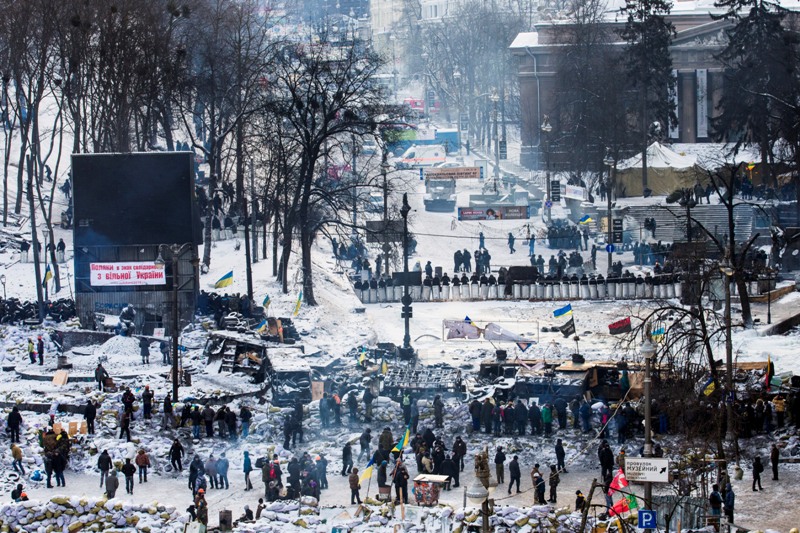The International Press Institute (IPI) and its affiliate, the South East Europe Media Organisation (SEEMO), today welcomed news that Ukraine’s parliament voted to repeal sweeping anti-protest legislation that had touched off violent clashes between protestors and police.
A large majority of lawmakers voted yesterday to scrap provisions of the law, which among other troubling provisions recriminalised libel and severely restricted freedom of expression and assembly. President Viktor Yanukovych must still formally approve the repeal, but he indicated on Monday following talks with opposition leaders that he would do so.
IPI Press Freedom Manager Barbara Trionfi said: “We are pleased to hear that parliament has voted to repeal these measures, which had dire implications for democracy in Ukraine, and we urge the president to sign this measure. We further urge lawmakers and the president to approve an amnesty for those targeted under this legislation during its brief, but extremely unfortunate, tenure.
“Additionally, we demand that the government conduct a swift, transparent and full investigation into the staggering number of reports of injured journalists, and that it hold all those responsible for these incidents – especially members of the security forces who are alleged to have specifically targeted journalists – accountable for their actions.”
Parliament hastily passed the legislation on Jan. 16 by a show of hands in an attempt to end protests that have gripped Kiev in the two months since Yanukovych froze plans to sign an association agreement with the European Union.
Dozens of journalists have been injured in connection with the protests and RFE/RL reported on Monday that at least four people had died in connection with the unrest and six others were missing.
IPI today spoke with Fedir Sydoruk – a former journalist with 15 years of reporting in Ukraine, most recently at the television station TVi – who has been present at Kiev’s central square, the Maidan Nezalezhnosti, which has formed the heart of the protests. A portion of that conversation appears below.
IPI: Does the repeal that parliament passed yesterday roll back the entire package of anti-protest legislation or do parts remain?
Sydoruk: Not all of it. There are, I think, 11 parts. Eight of them were repealed. The other three deal with the budget and the economy.
IPI: You have been present at the Maidan during the protests, and you said that you were there yesterday evening, after Prime Minister Mykola Azarov also announced that he would step down. What was the atmosphere like?
Sydoruk: I would say it has lifted. Sort of joyous. But people understand the need to stay. It’s considered a first step in the right direction, but not victory.
IPI: What will it take to bring people off of the streets?
Sydoruk: At this moment, there are different factions. Some would be happy if the president stepped down. Some would be happy if the government changed. Some would be happy if there were new elections for parliament and the president. The main thing that binds them all together is punishing the murders and crimes … that were committed, probably, by the police.
IPI: We saw violent clashes between some demonstrators and the security services throughout the last week. Has that continued in the last 24 hours?
Sydoruk: No, there have been no clashes, at least in Kiev.
IPI: What proportion of the demonstrators was involved in the clashes and what proportion has remained peaceful?
Sydoruk: I can’t say. The majority is peaceful. But there is a large minority… Probably 30 to 40 percent have been part of the clashes. Those who are there all the time took part in clashes. There are 5,000 to 6,000 people at the camp [that protestors have established on the Maidan] all the time. Others join temporarily; they’re largely peaceful. But the ones who are there permanently are mostly radicals.
IPI: The Institute for Mass Information reported that, as of yesterday, at least 60 journalists have been injured covering the clashes.
Sydoruk: I think it’s higher. Some journalists didn’t want to go to the hospital because of the proven fact of police taking people there into custody. This has happened also in the regions [outside Kiev]. If anything, I think the number has been underestimated.
IPI: What are your thoughts on reports that security services specifically targeted journalists?
Sydoruk: I have not witnessed that myself, but I have heard that from many of my colleagues. It is important to note that no journalists have reported being hurt by protestors. Such a massive number of people, over 60, it cannot be a coincidence. We have seen the videos and heard reports of police shooting at people with cameras and at journalists wearing orange vests that say “press” on them. When you’re aiming a gun and you see orange, you know it’s a journalist.
If you have any questions or would like more information about this statement, please contact IPI Senior Press Freedom Adviser Steven M. Ellis at +43 (1) 512 9011 or email sellis[at]freemedia.at.



